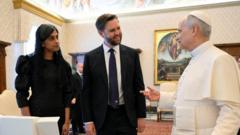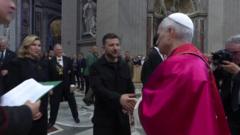As Pope Francis’ tenure comes to a pivotal moment, the betting markets are reacting as Cardinal Pietro Parolin leads the race for papal succession.
Betting Odds Heat Up As Conclave to Elect Next Pope Approaches

Betting Odds Heat Up As Conclave to Elect Next Pope Approaches
Online predictors face difficult task forecasting the Vatican's next leader amid shifting dynamics.
May 7, 2025, 9:26 a.m. ET
In an intriguing blend of tradition and technology, online betting platforms have turned their attention to the papal conclave set to commence this Wednesday. Historically, speculation surrounding papal elections dates back over 500 years, but this marks the first time that major online prediction markets are involved, with a surge of wagers being placed.
Cardinal Pietro Parolin of Italy is currently the frontrunner to take over from Pope Francis, according to prominent prediction platforms like Polymarket and Kalshi. Despite recent reports questioning his health—claims the Vatican has denied—Parolin has maintained his position as the favored candidate. Other strong contenders include Cardinal Luis Antonio Tagle from the Philippines and Cardinal Matteo Zuppi from Italy.
The challenge of forecasting papal elections contrasts sharply with the relatively predictable realm of presidential elections where multiple public data sources quantify betting activity. Experts have cautioned that the closed nature of the conclave, involving around 133 cardinal electors sworn to secrecy, provides little to no insights for bettors. Franca Giansoldati, a Vatican specialist, expressed skepticism about the ability of online betting platforms to grasp the complex dynamics at play.
Historical precedents emphasize the unpredictability of conclave politics. In 2013, for instance, Cardinal Angelo Scola was initially viewed as the likely successor, yet Cardinal Jorge Mario Bergoglio—who would twelfth in line—was ultimately elected. This outcome serves as a testament to the fickle nature of decisions made behind the Vatican's closed doors.
Furthermore, the politics among cardinals often unfold in unseen moments that can dramatically alter the voting landscape. Stefano Maria Paci, a noted Vatican analyst, insists that forecasting the vote requires an understanding of unpredictable intra-conclave alliances and maneuvers.
Amid these uncertainties, enthusiasm remains robust in the betting markets. As of Wednesday afternoon, wagers placed regarding the conclave have surpassed $27 million—an amount that rivals the betting volumes for major sports events like the Super Bowl. As the conclave draws nearer, all eyes will be on the Sistine Chapel, where the next pope’s fate will be determined.
In an intriguing blend of tradition and technology, online betting platforms have turned their attention to the papal conclave set to commence this Wednesday. Historically, speculation surrounding papal elections dates back over 500 years, but this marks the first time that major online prediction markets are involved, with a surge of wagers being placed.
Cardinal Pietro Parolin of Italy is currently the frontrunner to take over from Pope Francis, according to prominent prediction platforms like Polymarket and Kalshi. Despite recent reports questioning his health—claims the Vatican has denied—Parolin has maintained his position as the favored candidate. Other strong contenders include Cardinal Luis Antonio Tagle from the Philippines and Cardinal Matteo Zuppi from Italy.
The challenge of forecasting papal elections contrasts sharply with the relatively predictable realm of presidential elections where multiple public data sources quantify betting activity. Experts have cautioned that the closed nature of the conclave, involving around 133 cardinal electors sworn to secrecy, provides little to no insights for bettors. Franca Giansoldati, a Vatican specialist, expressed skepticism about the ability of online betting platforms to grasp the complex dynamics at play.
Historical precedents emphasize the unpredictability of conclave politics. In 2013, for instance, Cardinal Angelo Scola was initially viewed as the likely successor, yet Cardinal Jorge Mario Bergoglio—who would twelfth in line—was ultimately elected. This outcome serves as a testament to the fickle nature of decisions made behind the Vatican's closed doors.
Furthermore, the politics among cardinals often unfold in unseen moments that can dramatically alter the voting landscape. Stefano Maria Paci, a noted Vatican analyst, insists that forecasting the vote requires an understanding of unpredictable intra-conclave alliances and maneuvers.
Amid these uncertainties, enthusiasm remains robust in the betting markets. As of Wednesday afternoon, wagers placed regarding the conclave have surpassed $27 million—an amount that rivals the betting volumes for major sports events like the Super Bowl. As the conclave draws nearer, all eyes will be on the Sistine Chapel, where the next pope’s fate will be determined.





















